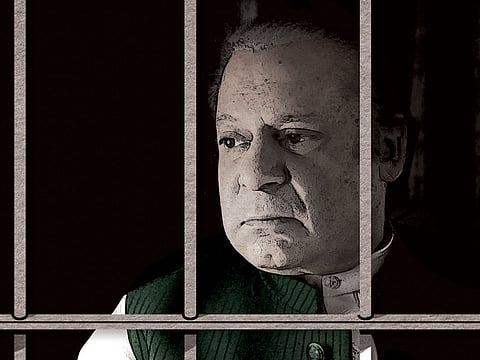Sharif’s conviction a major turning point
The onus now lies with Pakistan’s present and future rulers to follow through with a continuing campaign to weed out corruption

Friday’s conviction of Pakistan’s former prime minister Nawaz Sharif to a ten-year prison term by an anti-corruption court, marked no less than a landmark event in a country where the rich have often considered themselves beyond the reach of law. The conviction followed a case related to several luxurious properties in the uber-posh Mayfair area of London belonging to the former prime minister’s family, and their failure to prove that the mansions were purchased with legitimate income.
Sharif’s daughter, Maryam Nawaz, sentenced to seven years in prison and her husband to a one-year jail term only added to the turmoil surrounding Pakistan’s once most powerful political family. Taken together, these convictions may well bring a sliver of hope to many ordinary Pakistanis who had more than ample reason to give up on the rule of law ever returning to the South Asian country.
And the former first family’s downturn of their once widely-cherished fortunes goes well beyond just the courts’ verdict. The collapse of a recently-built main road after heavy rainfall in central Lahore in the past week, instantly triggered calls for an in-depth review of public works undertaken under the former ruling family and members of their political coterie. Such a rare event on the political home turf of Sharif naturally has thrown up a significant fallout.
Pakistan’s populous Punjab province, of which Lahore is the capital, was ruled by Pakistan Muslim League-Nawaz (PML-N) led by Sharif. His younger brother, Shahbaz Sharif, who served as chief minister of Punjab, took pride in leading major projects from the front — part of a well-thought out political strategy to consolidate the PML-N’s position across the Punjab.
As Pakistan prepares for elections on July 25, a number of aspects of the former government’s performance are increasingly in question. The PML-N’s tenure saw the largest addition to Pakistan’s national debt under the five-year tenure of any government in the country’s history. But the collapse of the road has become a particularly stark example of the gaps surrounding the former regime’s tenure, as it undertook one large initiative after another.
Visitors to Lahore have witnessed first-hand the city’s treasured history preserved through many of its landmarks. These range from structures showing off the legacy of Maharaja Ranjeet Singh, the most prominent Sikh ruler who ruled his empire from Lahore, to the grand mosque and the Lahore fort built under the rule of Muslim Mughal rulers in India. South Asia’s British colonial masters also contributed to this legacy with many colonial-era buildings still standing tall in the city.
To date, there is little evidence of these structures that date back hundreds of years, collapsing under the weight of monsoon rain. In sharp contrast, the recently-built road that collapsed in central Lahore stands out as a stark example of architectural mediocrity coupled with dodgy quality of construction material that made it to come tumbling down.
As the Sharif brothers and PML-N face compelling questions, the issue of their peculiar style of government is hard to ignore. The Sharifs showed an apparent disdain for following a structured rule where time-tested methods were closely followed in running daily affairs of the government. Instead, a preference for quick-fixes in tackling complex challenges became the order of the day. In the case of Shahbaz, the former CM frequently showed off a penchant for playing to the gallery, often by personally visiting sites of government projects.
In demonstrating his widely-publicised “speed” for tackling affairs of the state, the former chief minister also publicly summoned senior officials and reprimanded some of them for not being up to the mark with their jobs — all in front of TV cameras. Tragically, however, such drama was played out just for cheap popularity and caused more harm than good to Pakistan’s prospects.
The younger Sharif’s style of functioning ended up sidelining some of the most reputed civil servants, forcing them to become redundant. Notwithstanding Shahbaz’s public demonstration of delivering “good governance”, what came out was just the opposite. Reports from independent observers, notably those with a fix on human rights conditions, presented detailed accounts of abuse of the public at the hands of government functionaries in Punjab — particularly the police.
Similarly, while the younger Sharif claimed to have rejuvenated major cities in the Punjab province, accounts from the grass roots presented a dismal picture. In the past five years, the incidence of graft at the grass roots has remained the order of the day rather than being scaled back, following official initiatives to improve public’s access to the government.
On the other hand, a reckless drive to spend money on fancy projects, without due regard for long-term sustainability of fresh loans, has only weakened Pakistan’s economic outlook. Saddled with growing pressure on foreign reserves, Pakistan is now surrounded with widespread speculation over becoming the next likely candidate for a fresh loan from the International Monetary Fund (IMF). If so, IMF money will come in tandem with tough belt-tightening measures that will only undermine the quality of daily lives of ordinary Pakistanis.
In spite of such grim conditions, Pakistan’s future remains tied to its ability to reform itself with Friday’s verdict providing the necessary impetus. Following Sharif’s conviction, the onus now rests on the country’s present and future rulers to follow through with a continuing campaign against corruption. In a country where much has gone wrong in recent years, Friday’s verdict on its own can only be the first step towards a reformed nation.
Farhan Bokhari is a Pakistan-based commentator who writes on political and economic matters.


